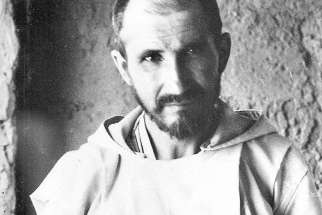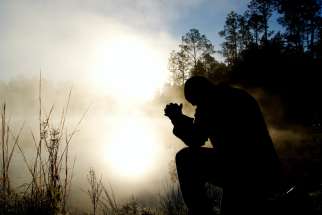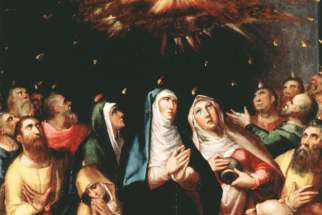18th Sunday in Ordinary Time (Year C) July 31 (Ecclesiastes 1:2; 2:21-23; Psalm 90; Colossians 3:1-5, 9-11; Luke 12:13-21)
The author of Ecclesiastes does not seem like the sort of person one would want to invite to dinner or to a party. His voice is wearied, passionless and a bit cynical. Nothing seems to interest or excite him.
17th Sunday in Ordinary Time (Year C) July 24 (Genesis 18:20-32; Psalm 138; Colossians 2:12-14; Luke 11:1-13)
How do we respond to the chaos, fear, violence and injustice of our times? One of the most potent tools at our disposal is intercessory prayer.
16th Sunday in Ordinary Time (Year C) July 17 (Genesis 18:1-10a; Psalm 15; Colossians 1:24-28; Luke 10:38-42)
Abraham and Sarah had all but given up. God had promised Abraham a son and heir and that he would become a father of a great nation. But the time on the biological clock had run out, for they were both far advanced in years, and no son by Sarah had been born. And this is often the moment God chooses to act — when all human efforts have been exhausted.
Really listen when Jesus speaks
I recently learned my liver cancer had gotten more aggressive. “Aggressive” is not descriptor you want to hear with cancer. Something like your cancer has gotten “nicer” or more “considerate” would have been great.
15th Sunday in Ordinary Time (Year C) July 10 (Deuteronomy 30:10-14; Psalm 69; Colossians 1:15-20; Luke 10:25-37)
Where can we find God? Even the greatest mystics and saints experienced times in which they felt that God was absent. They struggled with doubts and fears, as do most people.
God’s kingdom is not for the half-hearted
13th Sunday in Ordinary Time (Year C) June 26 (1 Kings 19:16b, 19-21; Psalm 16; Galatians 5:1, 13-18; Luke 9:51-62)
Elijah was looking for a worthy disciple and successor and he had a novel recruiting method.
Sifting clutter to discover grace
Saturday morning in early June. Sunshine streaming through lilac bushes. Birds singing from underneath leaves that seem to have grown overnight. And tables full of things we hope other people will like well enough to take home. There are stories attached to the stuff. The kids keep changing their minds and sneaking things back in the house. The seeing and the sifting happen simultaneously.
Most Holy Body and Blood of Christ (Year C) June 19 (Genesis 14:18-20; Psalm 110; 1 Corinthians 11:23-26; Luke 9:11b-17)
The early Church Fathers taught that Christ had always been preparing the way for the redemption that would come through the incarnation, crucifixion and resurrection. This is evident in the story from the very beginning of Israel’s history — the wandering of Abraham, still named Abram, and his meeting with the mysterious king of Salem, a man named Melchizedek.
Most Holy Trinity (Year C) June 12 (Proverbs 8:22-31; Psalm 8; Romans 5:1-5; John 16:12-15)
God is described in countless ways in the Scriptures, confirming that God cannot be contained by any one image or symbol. The ancient sources do not use the theological precision that modern people are used to and can at times appear to be inconsistent or contradictory. This can be confusing to some. The God-language of Scripture inspires the sacred imagination of the reader or hearer, revealing the depths and activities of the divine.
Seeking silence in our confused times
It’s impossible to hold a real conversation when it’s peppered with mean, toxic words. The more our attempted conversation becomes thwarted by invective, the more we lose the ability to hear and speak at all. A silence creeps forth, not the sweet silence of life and growth but the terrible silence of contempt, disdain and denial.
Sick and tired becomes sick then saved
“Healing” is a hot topic today. Humanity seems to feel a keen need of healing today, but are we getting to the root cause of our maladies? Are we utilizing the proper remedies? Since human beings are a composite of body and soul, we can’t talk about healing one without healing the other.
Be your own Maverick
I had the great pleasure to see Top Gun: Maverick last weekend. Considering the action flick netted a Memorial Day weekend record $156 million domestic box office haul, I was one of many Canadians and Americans taking the “highway to the danger zone.”
Pentecost Sunday (Year C) June 5 (Acts 2:1-11; Psalm 104; 1 Corinthians 12:3b-7, 12-13; John 20:19-23)
If a hundred believers were asked to explain the nature, role and workings of the Holy Spirit, there would probably be 100 or more answers. Backed into a corner, many have little understanding of the Spirit and its actions. The Holy Spirit has been invoked to bolster authority and to challenge it; to support the status quo and to overturn it; to head in new theological and spiritual directions and to retreat behind the fortified walls of tradition.
Ascension of the Lord (Year C) May 29 (Acts 1:1-11; Psalm 47; Ephesians 1:17-23; Luke 24:44-53)
Our worldview and understanding of the cosmos are very closely linked with our theology and image of God. If one changes, the other must also adapt. Although this is usually met with resistance, these changes have occurred many times in the past and will continue to do so.
The false divide of spiritual and religious
If you’re reading The Catholic Register, you’ve probably never said: “I’m spiritual but not religious.” However, you’ve certainly heard someone else state this now almost cliché phrase. Let’s count the ways this phrase is false… and dangerous. (What I generally say to people who tell me they are “spiritual but not religious” is: “You may want to be careful with that.”)















